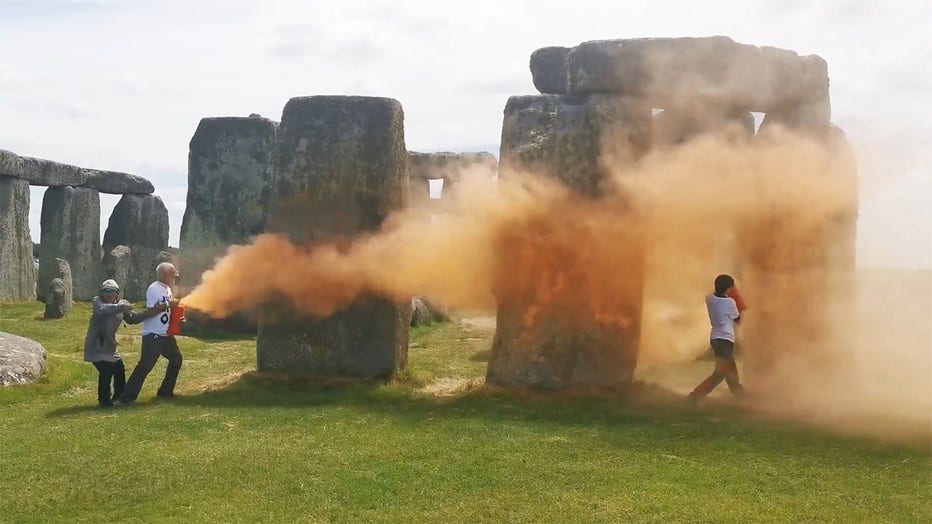Stonehenge vandalized by climate protesters ahead of summer solstice 2024
LONDON - Just a day before thousands of people are expected to gather at the ancient Stonehenge site for the summer solstice, two climate protesters were seen on Wednesday spraying orange paint onto the monument in southern England – leading to their arrest.
The act by Just Stop Oil was captured on video and released by the group, showing a man it identified as 73-year-old Rajan Naidu unleashing a fog of orange from a fire extinguisher-style paint sprayer at one of the vertical stones.
As voices can be heard yelling "stop," a person wearing a ballcap and raincoat ran up and grabbed Naidu's arm and tried to pull him away from the monument. A man in a blue shirt joined in and wrestled the paint sprayer away.
The second protester, identified as Niamh Lynch, 21, managed to spray three stones before the first bystander in the hat stopped her.
Stonehenge was built on the flat lands of Salisbury Plain in stages starting 5,000 years ago, with the unique stone circle erected in the late Neolithic period about 2,500 B.C.
Wiltshire Police said the pair were arrested on suspicion of damaging one of the world’s most famous prehistoric monuments and a UNESCO World Heritage Site.

Just Stop Oil protesters sprayed orange powder onto Stonehenge, the iconic megalithic structure near Salisbury, England, on June 19, 2022. (Credit: Just Stop Oil via Storyful)
The act by Just Stop Oil was quickly condemned by Prime Minister Rishi Sunak, who called it a "disgraceful act of vandalism." Labour leader Keir Starmer, his main opponent in the election next month, called the group "pathetic" and said the damage was "outrageous."
English Heritage, which manages the site, said it was "extremely upsetting" and said curators were investigating the damage. Just Stop Oil said the paint was made of cornstarch and would dissolve in the rain.
The incident came just a day before thousands are expected to gather at the roughly 4,500-year-old stone circle to celebrate the summer solstice — the longest day of the year in the Northern Hemisphere.
The incident was also one of several by environmental groups around Europe that have received attention — and heavy criticism — for disrupting sporting events, splashing paint and food on famous works of art and interrupting traffic to draw attention to global warming.
This story was reported from Cincinnati. The Associated Press contributed.

